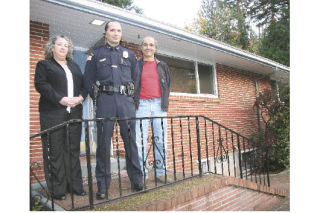The next few months will see big changes for the nascent Snoqualmie Tribal Police Department.
From origins last summer with a single officer at the helm, the force is expected to add staff, set up a station and replace King County Sheriff’s Department as the primary responder to Snoqualmie Casino, which opens this week.
Snoqualmie Tribal Police Chief Duane Garvais-Lawrence has been on the job since being hired in July, but received his official, symbolic oath of office from Tribal Administrator Matt Mattson on Wednesday, Oct. 29, before members of the Snoqualmie tribal council. In his oath, Garvais swore to uphold the constitution of the United States and the Tribe, to support and honor the 1855 Point Elliott treaty, and to observe the law enforcement code of ethics.
On Nov. 1, Garvais brought in his department’s first employee, law enforcement assistant Veronica Port. Port will assist Garvais in pursuing accreditation through the Commission on Accreditation for Law Enforcement Agencies, or CALEA.
Port, who has Cree affiliation, and volunteered with the Los Angeles Sheriff’s Department and the Auburn Police Department, was part of a pool of about 10 candidates who went before a review board including tribal members and staff from the city of Snoqualmie. Garvais said Port was the clear choice because of her working knowledge of CALEA.
“My idea is to build this department with those standards already in place,” he said.
Garvais is currently working on the hiring process for a patrol sergeant for the department, with an anticipated hire date of Dec. 1. Eventually, the force will grow to include two sergeants, three or four police officers, and a community officer, who will work with the Tribe, cities, schools and local agencies to connect to the Valley at large.
“Any community function that’s going on in this area, I want them to be a part of it,” Garvais said.
The Tribe already has one reserve officer: former Snoqualmie Mayor Randy “Fuzzy” Fletcher.
Valley presence
Besides the new casino, Tribal police will have a presence at property adjacent to Snoqualmie including the old Nelems hospital and tribe-owned Snoqualmie Valley Hospital campus, rented buildings in downtown Snoqualmie and Carnation, and the Raging River Alcohol Treatment Center.
Currently, King County Sheriff’s Department is the primary responder to the casino site, but starting Feb. 1, tribal police will be the main response. In the case of a major crime, such as a murder, the Tribe must notify the FBI and the special agent in charge of the federal Bureau of Indian Affairs.
The rules that govern how tribal police and tribal courts interact with Native American and non-native suspects and victims are complicated. The law sets out different jurisdictions — tribal, state and federal — depending on the crime, who committed it, where it was committed, and who the victim was. However, Garvais is pursuing federal commissions and state peace officer certification for his department to close any loopholes.
“The last thing you want is criminals running in one jurisdiction or another, because they think it’s a haven,” Garvais said. “It really doesn’t matter what happens. We’re able to respond to protect tribal and non-tribal members.”
When tribal police do nab a suspect, that person might wind up at a holding cell at the new casino, or go to the Tribe’s new police station, a former brick house not far from Snoqualmie Valley Hospital on 384th Avenue. There, the building is being remodeled into a police station for the department’s initial months or years; eventually, a new station would be built elsewhere.
The building will include offices for Garvais and his staff, an evidence room, special, separate computer servers for the department, that would include a special sex offender registration database, and a sally port and secure fingerprinting and DUI processing area that would be under constant surveillance.
“There’s lots of potential.” Garvais said. The Tribe is pursuing an agreement with the Chehalis tribe to house prisoners.
Since getting the job, Garvais has discovered that he has several family connections to the Valley. His great-grandather, Thomas McDonald, grandfather Fred McDonald and uncle Ron McDonald owned and operated a gas station in Snoqualmie in the 1930s. Thomas McDonald originated in Scotland, and ended up being buried in North Bend. Garvais’ uncle, Glen McCuen, owned and operated a Snoqualmie salvage yard.
“To me, it’s a blessing” to discover these roots, he said. “It was like coming home.”
As the new tribal police department gets up to speed, Garvais expects to be kept busy by the accreditation process and the new casino.
“The casino is going to be a huge, positive impact on this community,” he said. “The Tribe is wanting to partner to bring money back to the community, as that is up and running. You’re going to see the Tribe moving forward with a lot of ideas. We’re going to be expanding pretty quick.”



